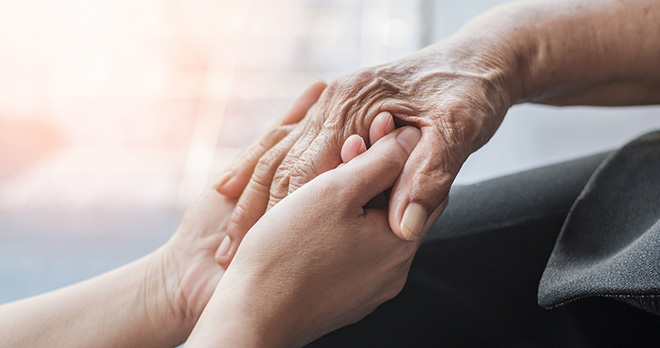Euthanasia – both sides of the argument

We need to talk about death
A book I have been reading recently has introduced me to the concept of an end-of-life, or death, doula. End-of-life doulas provide support for those people who have a terminal illness, whether that is practical, emotional, or spiritual support. This is not something I had ever considered before, but this is probably no surprise, as death is not something that we ever really talk about beyond the practical side of what happens after we die.
As lawyers we are aware of the importance of getting your affairs in order; making sure you have a Will and that financial arrangements are in place to support your loved ones after you die. As a parent, I want to ensure that if I die my children will have appropriate guardians in place and the financial means to support them through to adulthood.
But what about how I die? This is not something that I, or many others, think about, let alone discuss. But many palliative care experts consider that talking about dying and death can help to ensure that everyone gets the support they need, that suits them. There is no one-size-fits-all in death.
For some of us, we will have no warnings about our impending death, although that should not prevent us from being open and frank in talking about it. Dying Matters Awareness Week is 6 to 12 May 2024. It is a movement to encourage us to talk about death, dying and grief.
But what about those who are diagnosed with a terminal condition, such as mesothelioma, who have a prognosis regarding their death. Hospice UK consider that “Honest, timely conversations about death and dying are essential to good end of life care”. So, how can they use this knowledge to plan their death? Can they choose when they die?
Euthanasia: the law
Euthanasia is the “act of deliberately ending a person’s life to relieve suffering”. It is distinguished from assisted suicide, which is assisting another person to kill themselves.
Both euthanasia and assisted suicide are illegal in England, with maximum penalties of 14 years imprisonment for assisted suicide, and life for euthanasia. Assisted suicide prosecutions can also extend to cover those who travel with loved ones abroad to places such as Dignitas in Switzerland.
Despite this, one campaigning group, Dignity in Dying, say that 300 dying people end their own lives in this country every year. Another 350 Britons have also travelled to Dignitas to end their life there. So, is there a need for legislation in England to change? Should we be allowed to choose how and when we die?
Dignity in Dying
Dignity in Dying is an organisation who are campaigning for what they say is a choice, access, and control over how, where, and when we die. But assisted dying is not something which they say should be available to everyone. They are focused only on those with a terminal illness, with six months or less to live.
Dignity in Dying propose a similar law to that in Oregon and other US states, which requires the dying person to end their own life (not another person doing it for them), assessment by doctors and a High Court judge, and which allows the dying person to die at home.
Their position is that it should be dying people who are in control of their deaths, not doctors. They focus on freedom of choice and having a safe, comfortable, and dignified death.
Care not Killing
Conversely, Care not Killing is an organisation opposing euthanasia and instead promoting care. They want to work to promote better and more available palliative care and prevent any relaxing in the law surrounding assisted dying.
They want to ensure that those who are terminally ill do not feel like a burden to loved ones or the healthcare system and believe that, with appropriate palliative care, everyone can have a dignified and peaceful death.
Care not Killing highlight that if a law like that in Oregon was to be introduced in England, we would be looking at around 2,600 deaths per year. Alternatively, using the Netherlands model we would be looking at 13,000 deaths. It is clear therefore that any such legislation could have a significant impact.
Assisted Dying Bill
The call for assisted dying has been given additional weight recently after broadcaster, Esther Rantzen, revealed that she had signed up to Dignitas after her lung cancer progressed to stage 4. A petition was then signed by over 100,000 people calling for the Government to allocate Parliamentary time to debate assisted dying.
On 22 February 2024 the Ministry of Justice responded:
“The Government has the utmost sympathy for anyone experiencing the pain of watching a loved one deal with a life-threatening or degenerative condition.
Whether there are any circumstances in which it should not be an offence to assist another person to die is something on which there are passionately held but deeply divided views. Even amongst those who support a change in the law, there are differing ideas on where the line should be drawn, what safeguards should be in place and for whom. Conversely, others feel strongly that the law should not be changed and that safeguards will not necessarily give enough protection to vulnerable people who may feel pressure, whether real or perceived, to end their own lives.
It remains the Government’s view that any change to the law in this sensitive area is a matter for Parliament to decide and an issue of conscience for individual parliamentarians rather than one for government policy. Parliament has debated this issue on several occasions, most recently in July 2022, but has so far voted against proposals to legalise assisted dying.”
Dignitas
In the meantime, whilst the law in England remains static, many are continuing to choose to travel abroad to end their own life. One such example is Bob Cole who was diagnosed with mesothelioma.
Bob was a campaigner for Dignity in Dying after his wife, Ann, died at Dignitas in Switzerland following a diagnosis of progressive supranuclear palsy, a rare and fatal neurological disease. Bob said in an interview before his death, that Ann’s death was peaceful, quiet, and dignified. After his diagnosis, Bob began to suffer with increasing pain from his mesothelioma and wanted to be able to choose the same death for himself.
Bob also chose to die at Dignitas in Switzerland, a choice not necessarily available to everyone due to the significant cost involved, and the fact that you must be fit enough to travel there. Another consideration is that potentially you must travel on your own, as any loved ones who travel with you risk being prosecuted for the offence of assisted suicide on their return to England.
Planning to die
It certainly cannot be denied that the category of people who will be most impacted by any assisted dying legislation are some of the most vulnerable members of our society, and therefore there is strong opinion on both sides.
But do we need assisted dying to have a dignified death?
I think we can all agree that, wherever possible, we would like to die in comfort, with dignity, and to be psychologically, practically, and spiritually prepared for death.
In the UK we have seen growth of end of life and palliative care services over the past 50 years. There has been more emphasis on suitable end-of-life care and achieving the best possible quality of life for patients. This is reflected in where people are choosing to die, with a greater number of people now dying at home rather than in hospital.
Hospices are invaluable in providing guidance and support in many aspects of end-of-life care including pain relief, symptom control, respite, practical and emotional care. They take a holistic approach to end-of-life care and are generally more comforting and homely environments than hospitals. But hospices are not available to all dying people as they are massively underfunded. Hospice UK reported in September 2023 that adult hospices have “faced a real-terms cut in their government funding of £47m in the past two years”. They are invaluable to our health care system and end-of-life care and yet remain largely charitably funded.
As individuals, we can have more say than ever before in what our death looks like. Hospice UK’s website even offers a planning ahead tool, highlighting different aspects that you may wish to consider when you plan how you will die.
Yet, in the UK, we have not yet gone as far as other countries in allowing those with life-limiting conditions to choose how and when to die. The debate surrounding this issue remains hotly contested and it remains to be seen if this issue will once again come before MPs for further debate.
What is clear is that discussion around death and dying needs to become a less taboo topic, and one we can all feel confident to discuss, and that further investment into palliative end-of-life care is needed.
Contact our mesothelioma and asbestos claims specialists today.
Call now



